
Date: 2025-12-12 Page is: DBtxt003.php txt00016594
Economics / Society
Inequality
The middle-class dream is moving beyond millennial reach
So ... what's new !!!!!!!!!!!! The fact of declining opportunity (in the USA) has been in evidence for several decades, and this is further confirmation of this reality. What does not get talked about is why there is an obscene level of economic inequality with relatively few owing a massive amount of wealth and a much larger number of people with little wealth and low wages ... or worse no wages. Business Schools have been teaching students how to increase profits for decades, but nobody seems to be arguing and teaching about fair profits and fair payrolls. A main reason for inequality is the top people are getting too much reward and the bottom getting too little reward. I want to see the payroll profile of business entities so that there is meaningful transparency about their social impact. Top people (including people in the WEF) avoid this issue like the plague. It has to be changed!
Peter Burgess
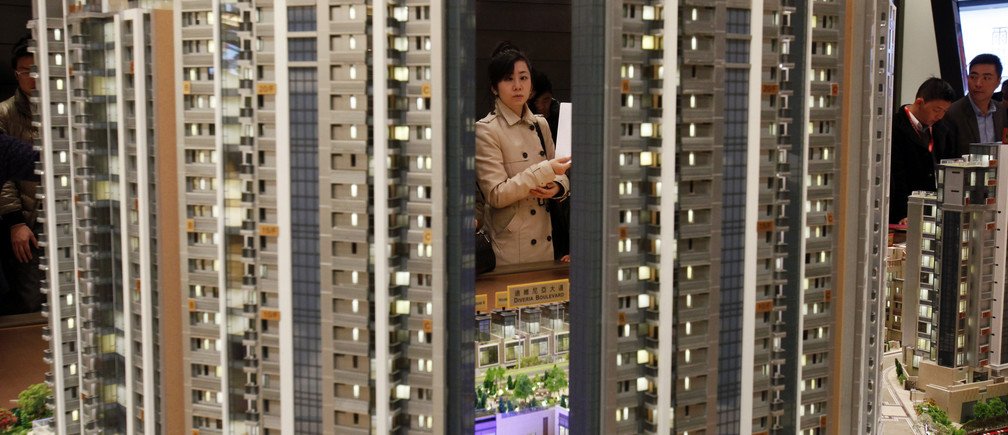
A potential buyer looks at a model of Riva, one of the latest developments by Sun Hung Kai Properties, in Hong Kong February 19, 2014. When things get choppy at the top of the property ladder, it pays to have your feet planted on the middle rungs, which makes developers Cheung Kong (Holdings) and Sun Hung Kai Properties the best bets to weather the storm brewing in Hong Kong. These powerful property developers are targeting middle-class, first-time buyers who are exempt from the impact of government cooling measures at a time when secondary home transactions are hovering at a 17-year low. Picture taken February 19, 2014. To match story HONGKONG-PROPERTY/ REUTERS/Bobby Yip (CHINA - Tags: BUSINESS REAL ESTATE TPX IMAGES OF THE DAY) - GM1EA2S058801 Once a bedrock of democracy, the middle class is becoming less stable. Image: REUTERS/Bobby Yip
Do you feel like your cost of living is rising? If so, you’re not alone. Years of low income growth and increasing prices have made the 'squeezed middle' a reality for many, with new research showing young people’s prospects are among the hardest hit. The middle class is shrinking in most countries and represents an out-of-reach dream for younger generations, according to the OECD’s report Under Pressure: The Squeezed Middle Class. Just 60% of millennials – people born between 1983 and 2002 – are part of middle-income households in their twenties, compared with almost 70% of baby boomers.
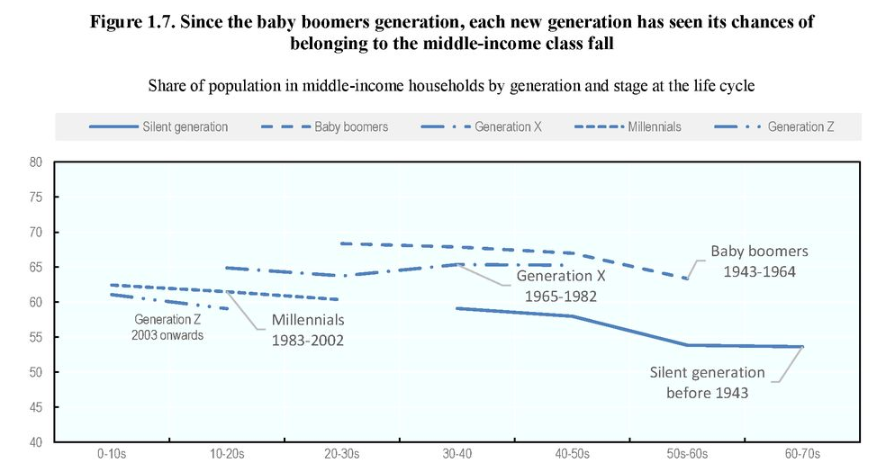
Image: OECD report, Under Pressure: The Squeezed Middle Class
“The middle class used to be an aspiration,” the report says. “However, there are now signs that this bedrock of our democracies and economic growth is not as stable as in the past.”
A healthy middle class matters, not just for equality and inclusion, but also because it propels consumption growth and investment and generates tax income that helps fund social safety nets.
OECD ➡️ Better policies for better lives ✔ @OECD
· Apr 11, 2019 🆕📘 The #MiddleClass in OECD countries is struggling. The number of people in the middle-income group has shrunk and its economic influence has declined.
Find out more in @OECD_Social's new report ➡️ http://oe.cd/2yA
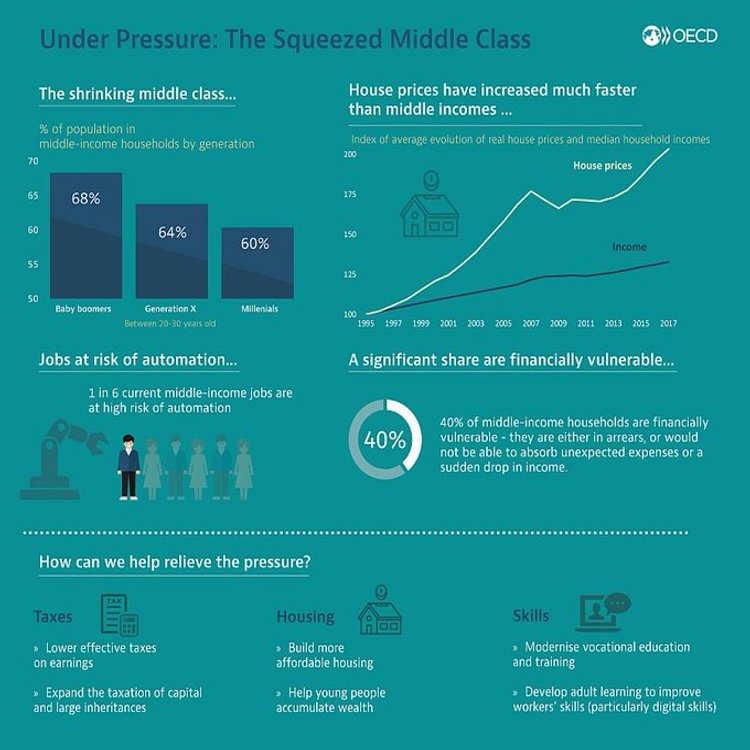
OECD ➡️ Better policies for better lives ✔ @OECD Why are #MiddleClass households under pressure? Because they feel...
- 💰 The socio-economic system is unfair
- 🏠 Life is expensive
- 🤖 Job prospects are uncertain
42 10:46 AM - Apr 11, 2019 Twitter Ads info and privacy

31 people are talking about this
The OECD defines middle class as a range around the median household income, which varies from country to country. In the US, that’s between about $23,000 and $62,000, whereas in Mexico it’s about $4,000 to $10,000.
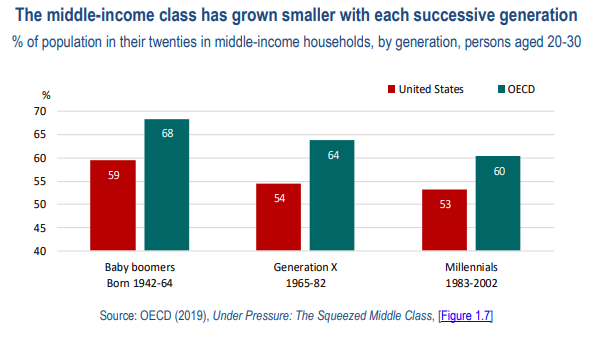
Shrinking away
While the absolute amounts vary from country to country, the global patterns are clear: income growth is sluggish and the cost of goods and services associated with a middle-class lifestyle are increasing.
One in five middle-income households spend more than they earn, and over-indebtedness is higher for them than for both low-income and high-income households, the report says. In addition, automation and the Fourth Industrial Revolution have destabilized the labour market, creating uncertainty around job prospects and opportunities for many people.
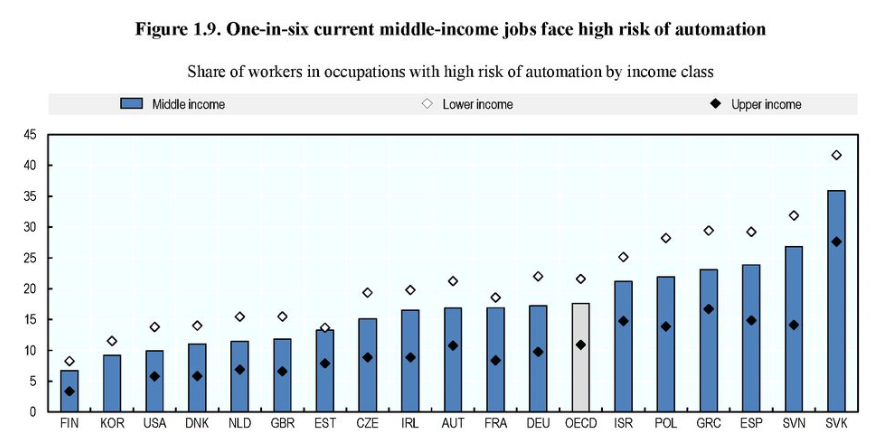
Image: OECD report, Under Pressure: The Squeezed Middle Class
These themes are echoed in the World Economic Forum’s Inclusive Development Index, which ranks economies using three pillars: growth and development, inclusion, and intergenerational equity and sustainability.
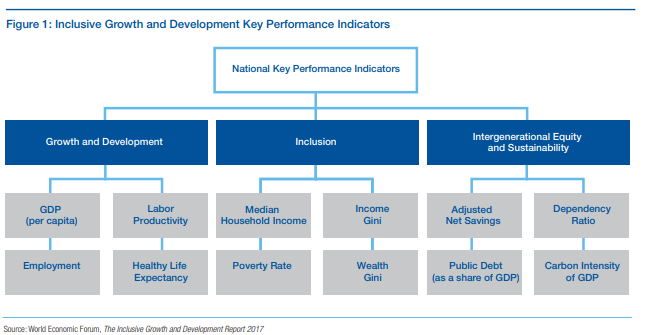
Ranking inclusive growth. Image: Inclusive growth and development report
Norway tops the list, with low income inequality and high living standards, and the report cites its “robust and generous social safety programmes”. The UK ranked 21st and the US was 23rd.
“Slow progress in living standards and widening inequality have contributed to political polarization and erosion of social cohesion in many advanced and emerging economies,” the report says. “This has led to the emergence of a worldwide consensus on the need for a more inclusive and sustainable model of growth and development that promotes high living standards for all.”
Government levers
Policy-makers need to recognize, prioritize and better measure inequality to maintain public confidence and raise living standards, according to the Forum. In a similar vein, the OECD says policies need to consider shifting the tax burden from labour income to income from capital, property and inheritance, as well as making income taxes fairer.
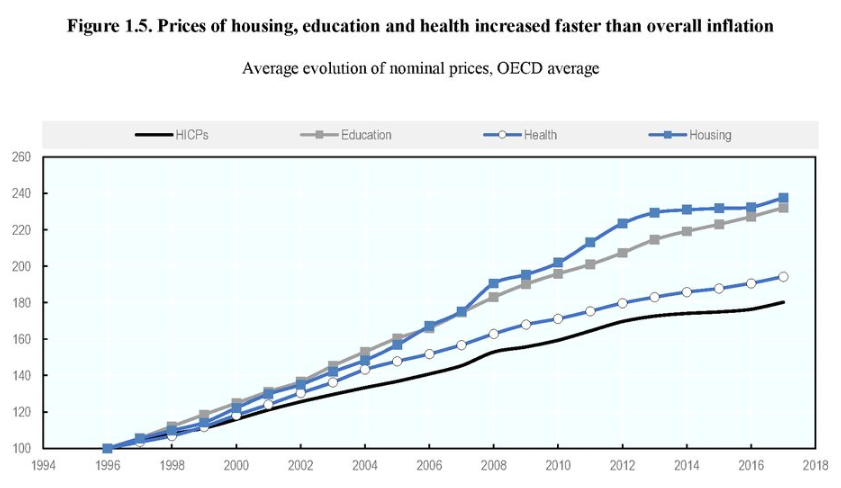
Image: OECD report, Under Pressure: The Squeezed Middle Class
Listening to those at risk of being left out is also important. In 2011, Professor Klaus Schwab, Founder and Executive Chairman of the World Economic Forum, started the Global Shapers Community to empower young people and help them play an active role in shaping their future. In a survey, members of this community cited income as the second biggest contributor to inequality, after corruption.
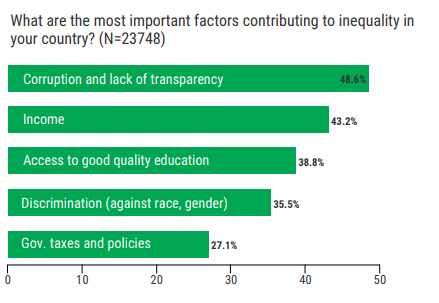
Image: World Economic Forum Global Shapers Survey
Rocky waters
The OECD says a comprehensive action plan is needed, and one that improves access to high-quality public services and ensures better social protection. It also recommended that policies encourage the supply of affordable housing and offer financial support and grants.
“Today the middle class looks increasingly like a boat in rocky waters,” says OECD Secretary-General Angel Gurría. “Governments must listen to people’s concerns and protect and promote middle-class living standards. This will help drive inclusive and sustainable growth and create a more cohesive and stable social fabric.”
Written by Emma Charlton, Senior Writer, Formative Content
The views expressed in this article are those of the author alone and not the World Economic Forum.
---------------------------------------------------------------------------
These vending machines are giving out free short stories to London commuters Kate Whiting 25 Apr 2019
The World Economic Forum Book Club – 12 months, 12 great books Beatrice Di Caro 23 Apr 2019
These countries have the most expensive childcare Sean Fleming 23 Apr 2019
More on the agenda Forum in focus Eight countries are closing the gender gap – many more will follow Read more about this project Explore context
Global Economic Imbalances Explore the latest strategic trends, research and analysis
Have you read? Generation Z will outnumber Millennials by 2019 Millennials now form the majority of the US workforce Here’s how millennials can make globalization 4.0 work for all